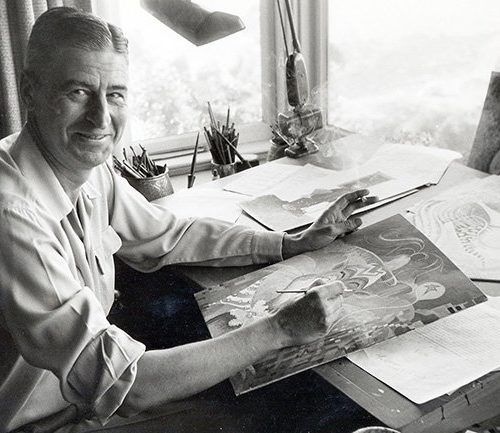
Theodore Geisel, the beloved children’s book author known as Dr. Seuss, was also the creator of highly impactful anti-fascist political cartoons during World War II.
Born in 1904, Theodore, known by friends as Ted, attended Dartmouth where he wrote for the humor magazine Dartmouth Jack-O-Lantern. After being caught drinking gin in his room (it was prohibition), Ted was allowed to stay in school but forbidden from participating in extracurricular activities, including Jack-O-Lantern. He started using the pen name Seuss (his mother’s maiden name) to continue contributing to the magazine without the college administration finding out.
After graduating from college, Ted attended Oxford University, planning to earn a PhD in English literature and pursue a career in academia. While there, he met fellow American student Helen Palmer, who persuaded him not to be an English teacher but rather an artist. “Ted’s notebooks were always filled with these fabulous animals,” Helen later said. “So I set to work diverting him; here was a man who could draw such pictures; he should be earning a living doing that.”
Ted followed Helen’s advice and left Oxford in 1927. They both returned to the U.S. and Ted started submitting drawings and articles to magazines, publishers, and ad agencies. Later that year, Ted was hired as a writer and illustrator at the popular satirical magazine Judge. He and Helen got married, and Ted’s career took off as his work appeared in high-profile ad campaigns and major periodicals like Life and Vanity Fair.
He started writing children’s books in the late 1930’s; his first one, And to Think That I Saw It on Mulberry Street, which became a classic, was rejected by 27 publishers. He continued writing for children, but when World War II began, Ted took a break from juvenile work and threw himself into political cartooning. In two years, he published over 400 cartoons taking aim at Hitler, Mussolini, and American isolationists like anti-Semite Charles Lindbergh, who vehemently opposed going to war with Germany. Many of Ted’s cartoons from this period criticized home-grown racism against African-Americans and Jews.
When the United States entered the war, Ted worked creating posters for the War Production Board. He joined the Army in 1943 as a Captain, and ran the Animation Department of the Army Motion Picture Unit. He wrote propaganda films encouraging the American public to support the Allied war effort.
After the war, Ted returned to writing kids’ books and wrote some of the most-loved children’s literature of all time. Dr. Seuss’s honors include two Academy Awards (for his short films during the war), two Emmy Awards, a Peabody Award, and the Pulitzer Prize. He has a star on the Hollywood Walk of Fame.
Ted and Helen were never blessed with children of their own. He said, “You have ‘em; I’ll entertain ‘em.”
Over the course of his career, Dr. Seuss revolutionized children’s literature, making books playful and relevant rather than dreary and heavy-handed. His books have sold over 600 million copies, and generations of children can trace their love of books to Dr. Seuss.
For using his talents to revolutionize children’s literature and fight injustice, we honor Theodore Geisel, aka Dr. Seuss, as this week’s Thursday Hero.
Get the best of Accidental Talmudist in your inbox: sign up for our weekly newsletter.